Sustainable Food
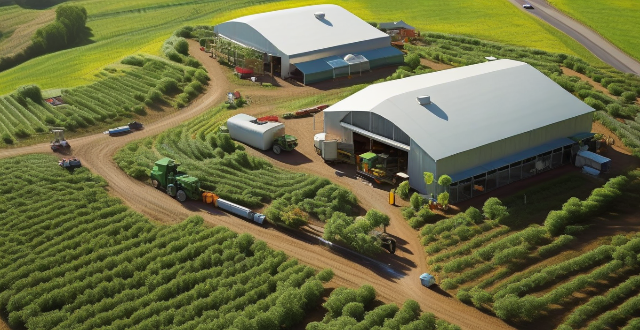
What role do sustainable farming practices play in maintaining food security amidst changing climate conditions ?
Sustainable farming practices are crucial for maintaining food security amidst changing climate conditions. They help farmers adapt to these changes by enhancing soil health, improving water management, promoting crop diversification, and integrating livestock and crop production. These practices also mitigate the impacts of climate change on agriculture by reducing greenhouse gas emissions, promoting biodiversity, and encouraging renewable energy use. Supporting smallholder farmers through training, access to markets, and cooperatives is essential for implementing sustainable practices at a larger scale. Overall, sustainable farming practices are vital for building resilient agricultural systems that can withstand climate change while ensuring food security for future generations.

What is the significance of traceability in the food supply chain for food safety ?
Traceability in the food supply chain is crucial for food safety, enhancing transparency, facilitating recalls, improving quality control, supporting regulatory compliance, enabling better risk management, and promoting sustainable practices.
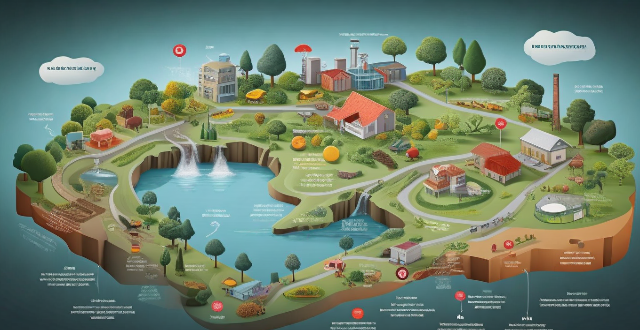
How does climate change affect agriculture and food security ?
Climate change significantly affects agriculture and food security by increasing extreme weather events, altering crop yields and quality, impacting livestock, and raising concerns about food access, affordability, and biodiversity loss. Adaptation and mitigation strategies such as sustainable farming practices, water management, genetic research, and policy initiatives are essential to build a resilient food system.

What is the importance of sustainable agriculture in achieving the Sustainable Development Goals ?
Sustainable agriculture is crucial for achieving the United Nations' Sustainable Development Goals by ensuring food security, improving rural livelihoods, and protecting the environment. It promotes soil health, increases crop yields, encourages biodiversity, creates jobs in rural areas, enhances income, promotes gender equality, reduces greenhouse gas emissions, conserves water resources, prevents land degradation, supports climate change mitigation and adaptation, stimulates economic growth, and reduces poverty. By adopting sustainable agriculture practices, we can create a more equitable and resilient world for future generations.

What is the difference between natural and organic food ?
Difference Between Natural and Organic Food Natural food is minimally processed with no artificial additives, while organic food follows strict production standards without synthetic pesticides or GMOs. Organic farming promotes soil health and biodiversity, offering potential environmental benefits.

How does climate change affect food security and nutrition ?
Climate change significantly impacts global food security and nutrition by causing extreme weather events, altering ecosystems, reducing water availability, affecting marine life, posing agricultural challenges, and diminishing nutrient intake. Mitigation strategies include sustainable agriculture practices, dietary diversification, and research and development to ensure future food security and nutrition.

How can sustainable investing help achieve the United Nations Sustainable Development Goals ?
Sustainable investing, which incorporates environmental, social, and governance criteria into investment decision-making, can significantly contribute to achieving the United Nations Sustainable Development Goals. It promotes environmentally friendly practices, enhances social well-being, advances economic growth and innovation, upholds good governance and partnerships, drives market trends towards sustainability, and attracts conscience-driven consumers. By aligning financial objectives with positive societal impact, sustainable investing creates a framework for long-term, sustainable growth that benefits people, planet, and profit.

How can climate services contribute to sustainable development ?
Climate services contribute to sustainable development by providing essential information for decision-making in various sectors. They help inform policy decisions, support agriculture and food security, enhance natural resource management, promote energy efficiency and renewable energy, improve public health outcomes, and encourage resilience and adaptation. By utilizing the insights gained from climate services, we can work towards a more resilient, equitable, and sustainable future.

How can we promote sustainable development to reduce the risk of climate conflicts ?
Sustainable development is crucial for reducing the risk of climate conflicts. To promote it, we can increase awareness and education, promote renewable energy sources, implement sustainable agriculture practices, invest in green infrastructure, encourage waste reduction and recycling, and collaborate with governments and NGOs.

What are the benefits of organic food ?
The provided text discusses the various benefits of organic food. The key advantages include: 1. **Health Benefits**: - No harmful chemicals, higher antioxidant levels, better nutritional content, and reduced risk of antibiotic resistance. 2. **Environmental Benefits**: - Sustainable farming practices, reduced pollution, lower energy consumption, and carbon sequestration. 3. **Economic Benefits**: - Supporting local farmers, creating job opportunities, long-term cost savings, and market diversity. Overall, choosing organic food contributes to personal health, environmental sustainability, and economic growth.
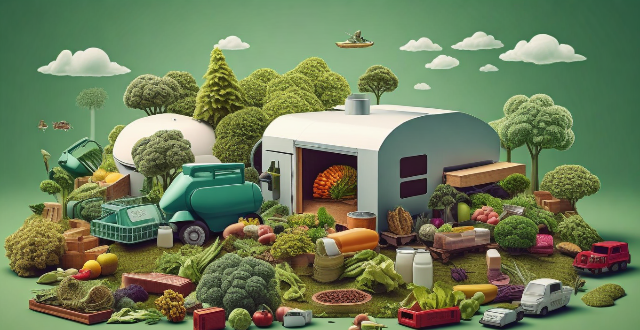
How do climate-friendly products contribute to sustainable development ?
The article discusses the importance of climate-friendly products in sustainable development. These products help reduce greenhouse gas emissions, conserve natural resources, support renewable energy sources, and encourage eco-friendly lifestyles. By using less energy or producing fewer pollutants during their production, use, and disposal, these products contribute to a healthier planet for future generations. Examples include energy-efficient appliances, electric vehicles, reusable water bottles made from recycled materials, bamboo toothbrushes, solar panels, wind turbines, hydroelectric generators, cloth shopping bags, and compostable food containers. As consumers become more aware of the environmental impact of their choices, they can make informed decisions that support a more sustainable future.

How can technology help us achieve the Sustainable Development Goals ?
Technology can significantly contribute to achieving the Sustainable Development Goals (SDGs) by offering innovative solutions to pressing global challenges. Here's a breakdown of how tech can aid in reaching these goals: 1. **No Poverty**: Digital financial services and e-commerce platforms can reduce poverty by providing access to financial services and global markets, respectively. 2. **Zero Hunger**: Precision agriculture and food delivery apps can increase food production and reduce waste, thereby combating hunger. 3. **Good Health and Well-Being**: Telemedicine and wearable devices can improve healthcare access and personal health monitoring. 4. **Quality Education**: Online learning platforms and augmented reality can provide equal educational opportunities and enhance learning experiences. 5. **Gender Equality**: Women's empowerment apps and online entrepreneurial platforms can promote gender equality and economic empowerment. 6. **Decent Work and Economic Growth**: Remote work technologies and skill development platforms can create job opportunities and enhance employability. 7. **Industry, Innovation, and Infrastructure**: Smart manufacturing and renewable energy technologies can drive industrial efficiency and sustainable infrastructure. 8. **Reduced Inequalities**: Data analytics and social media can help identify and address inequality, promoting social change. By harnessing technology, we can move closer to a more sustainable, prosperous, and equitable future for all.

How does climate governance affect sustainable development goals ?
Climate governance plays a pivotal role in shaping the achievement of sustainable development goals (SDGs). The interconnectedness between environmental preservation and socio-economic advancement necessitates a comprehensive understanding of how climate policies and actions influence the broader spectrum of global development objectives. ## **Impact on Individual SDGs** ### *Goal 2: Zero Hunger* Climate governance directly influences food security by addressing factors such as droughts, floods, and temperature fluctuations that can disrupt agricultural productivity. Effective climate policies can help to: - Ensure stable crop yields through improved irrigation systems and drought-resistant crops. - Mitigate the effects of extreme weather conditions on farming communities. - Promote sustainable land use practices to prevent soil degradation. ### *Goal 7: Affordable and Clean Energy* The transition towards renewable energy sources is at the heart of both climate governance and sustainable energy goals. Policies that encourage the adoption of clean energy technologies contribute to: - Reducing greenhouse gas emissions associated with traditional fossil fuel consumption. - Increasing access to electricity in off-grid areas using solar or wind power. - Creating new economic opportunities in the renewable energy sector. ### *Goal 13: Climate Action* This goal is inherently linked to climate governance, as it calls for urgent action to combat climate change and its impacts. Efficient climate policies can lead to: - Implementation of emission reduction strategies. - Enhanced resilience to natural disasters. - Promotion of environmentally friendly industries and jobs. ## **Cross-Cutting Impacts** ### Health and Well-being Climate governance affects public health outcomes by addressing air quality issues and reducing exposure to extreme weather events. This contributes to achieving: - **Goal 3: Good Health and Well-being** by minimizing climate-related health risks. ### Economic Growth Policies that foster green economies and low-carbon development pathways are crucial for: - **Goal 8: Decent Work and Economic Growth** by creating sustainable job opportunities. - **Goal 9: Industry, Innovation, and Infrastructure** through investment in green technology and infrastructure. ### Social Equity Climate governance also has implications for social equity and inclusion, particularly when considering the disproportionate impacts on vulnerable populations: - **Goal 10: Reduced Inequalities** by ensuring that climate adaptation and mitigation efforts do not marginalize already disadvantaged groups. ## **Conclusion** In conclusion, climate governance is an integral component of advancing sustainable development goals. By prioritizing climate action, nations can make strides in eradicating poverty, achieving food security, promoting health and well-being, and fostering economic growth while protecting the planet for future generations. The synergistic relationship between climate governance and the SDGs underscores the necessity for integrated policy approaches that consider environmental sustainability alongside social and economic development.

How does climate change influence nutrition and dietary health through changes in food production ?
Climate change affects nutrition and dietary health by altering food production, impacting crop yields, nutrient content, pest and disease pressure, and the availability and accessibility of food. Sustainable agricultural practices and adaptation are crucial for mitigating these effects and ensuring global food security.

How can we promote sustainable development while also tackling climate change and poverty ?
The text discusses a multi-faceted approach to promote sustainable development, tackle climate change and poverty. It suggests strategies such as renewable energy adoption, green economy and job creation, circular economy and resource efficiency, sustainable agriculture and food systems, conservation and protection of natural resources, and inclusive governance and partnerships. By implementing these strategies, we can work towards creating a more equitable and sustainable future for all.

How can we ensure that the benefits of sustainable development reach everyone, including the most vulnerable groups ?
The text discusses how sustainable development can be ensured to reach everyone, including the most vulnerable groups. It suggests a multifaceted approach that involves balancing economic growth, social inclusion, and environmental protection. The strategies include developing inclusive policies, ensuring access to opportunities like education and training, investing in sustainable infrastructure and accessible services, encouraging community engagement and advocacy, and implementing monitoring and accountability measures. By working together across sectors and levels of society, a more equitable and sustainable future can be built for all.

How can climate cooperation contribute to sustainable development goals ?
Climate cooperation plays a crucial role in achieving the United Nations' Sustainable Development Goals (SDGs), which aim to ensure that all people have access to the resources they need to live healthy, productive, and sustainable lives. By working together on climate action, nations can make significant progress towards several SDGs, including those related to poverty, hunger, health, education, gender equality, clean water and sanitation, affordable and clean energy, economic growth, and partnerships for the goals. Climate cooperation helps reduce the impacts of extreme weather events, natural disasters, and climate change on vulnerable communities, thereby contributing to poverty eradication efforts. It supports sustainable agricultural practices and promotes resilient food systems, ensuring food security and nutrition for all. Climate action helps reduce air pollution and improve public health outcomes, contributing to better respiratory health and overall well-being. Engaging women and girls in climate actions promotes gender equality by providing opportunities for leadership and participation in decision-making processes. Climate cooperation helps protect water resources from climate-related hazards, ensuring access to clean water and sanitation for all. Collaborative efforts in renewable energy research, development, and deployment contribute to universal access to affordable, reliable, and modern energy services. Climate cooperation creates green jobs and promotes sustainable economic growth, particularly in industries such as renewable energy and sustainable agriculture. Partnerships formed through climate cooperation drive innovation in sustainable technologies and infrastructure, fostering industrial development while minimizing environmental impacts. By addressing climate change, which disproportionately affects marginalized communities, climate cooperation helps reduce social and economic inequalities both within and among countries. Climate actions support urban planning and management that enhances inclusivity, resilience, and environmental sustainability in cities and human settlements. Climate cooperation encourages responsible consumption patterns and sustainable production methods, reducing waste and environmental degradation. This goal is directly linked to climate cooperation as it involves taking urgent action to combat climate change and its impacts. Through ocean conservation and sustainable fishing practices, climate cooperation helps protect marine ecosystems and biodiversity. By promoting sustainable land use and forest management, climate cooperation contributes to the conservation of terrestrial ecosystems and biodiversity. Climate cooperation builds peaceful societies and effective governance structures capable of managing environmental challenges and conflicts arising from resource scarcity. Climate cooperation itself is a form of international partnership that leverages collective action to achieve the SDGs more effectively. In conclusion, climate cooperation is not only essential for mitigating the effects of climate change but also for advancing the broader agenda of sustainable development. By integrating climate actions into national policies and international collaborations, we can work towards a future where environmental protection, social equity, and economic prosperity are mutually reinforcing goals.

How do Climate-Smart Technologies contribute to sustainable development ?
Climate-smart technologies play a crucial role in sustainable development by offering solutions that mitigate climate change, adapt to its impacts, and ensure food security while promoting economic growth. These technologies are resource-efficient, low-carbon, and resilient, making them integral components of the sustainable development goals (SDGs). Key ways in which climate-smart technologies contribute to sustainable development include: - Mitigating climate change through renewable energy sources like solar power, wind energy, and hydroelectric power; energy efficiency measures such as building insulation, LED lighting, and smart grids; adapting to climate impacts with water management systems like rainwater harvesting, drought-resistant crops, and flood control infrastructure; agricultural innovations such as precision farming, agroforestry, and cover cropping; enhancing economic growth with green industries like eco-tourism, clean manufacturing, and carbon trading markets; creating jobs and alleviating poverty through sustainable agriculture, renewable energy sector, and climate finance; promoting social well-being through health and safety measures like air quality monitoring, disaster early warning systems, and access to clean cooking solutions; and education and awareness initiatives including climate education programs, community-based adaptation projects, and research and development.
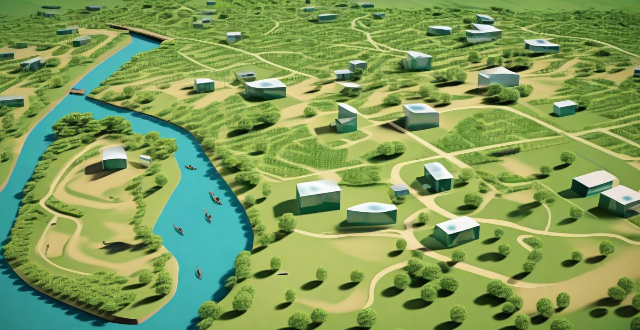
What is the role of ecosystem services in sustainable development goals ?
Ecosystem services, including provisioning, regulating, cultural, and supporting services, play a vital role in achieving sustainable development goals (SDGs) by providing essential resources for human well-being and economic development while maintaining the health and resilience of natural systems. Provisioning services like food security, clean water, energy, and medicinal resources are crucial for meeting SDGs 2, 6, and 7. Regulating services such as climate regulation, disease regulation, and flood and erosion control contribute to SDGs 13 and 15. Cultural services like recreation and tourism and cultural and spiritual values support SDG 8. Supporting services like soil formation and nutrient cycling and pollination are essential for agriculture and hence SDG 2. The interconnectedness of ecosystem services with other SDGs highlights their importance in building resilient societies that can withstand future challenges such as climate change, environmental degradation, and economic fluctuations. Preserving and enhancing these services is essential for achieving a sustainable future for all.

Why is temperature control important in food storage and preparation ?
Temperature control is crucial in food storage and preparation to ensure safety, quality, and longevity of food products. It prevents bacterial growth, avoids toxin production, maintains flavor and texture, preserves nutrients, extends shelf life, reduces waste, saves energy, and reduces environmental impact. Proper temperature control helps to enjoy delicious and healthy meals while minimizing the risk of foodborne illnesses and food waste.
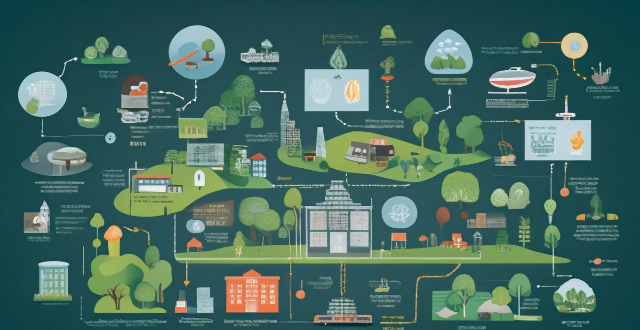
Can technology help improve food security in a changing climate ?
In the face of climate change, technology offers numerous solutions to enhance food production and distribution, contributing to global food security. Key areas where technology can make a significant impact include precision farming, genetic engineering, data analytics, water management, digital infrastructure, supply chain optimization, urban agriculture, and policy support. By leveraging these technological advancements, we can mitigate the adverse effects of climate change on agriculture and ensure a stable and sustainable food system for all.
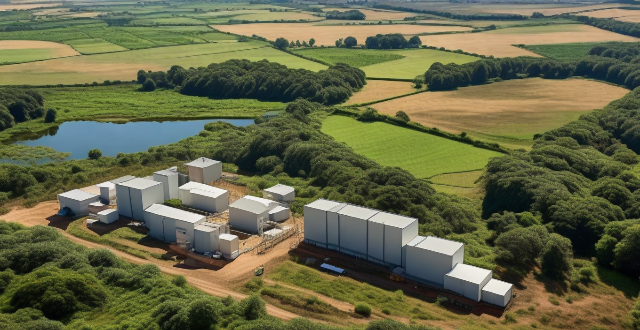
How does climate variability impact agriculture and food security ?
Climate variability significantly impacts agriculture and food security by affecting crop yields, livestock production, and the availability and accessibility of food. Direct impacts include changes in temperature, precipitation, extreme weather events, and CO₂ levels, while indirect impacts involve pest and disease outbreaks, water resource availability, soil quality, ecosystem services, market prices and trade, food accessibility and nutrition, and farmer livelihoods. Mitigation and adaptation strategies such as crop diversification, improved water management, breeding resilient crops, sustainable soil management, early warning systems, insurance and safety nets, policy support, and international cooperation are essential for building a climate-resilient food system.

How does food tourism impact local economies and cultures ?
Food tourism, also known as culinary or gastronomy tourism, has significant impacts on local economies and cultures. Economic benefits include job creation, increased revenue for local businesses, tourism diversification, infrastructure development, and value addition to local products. Culturally, food tourism promotes the preservation of traditions, cultural exchange, heritage promotion, adaptation and innovation, and community engagement. However, there are potential downsides such as overcommercialization, resource depletion, and pricing issues that require careful management to ensure authenticity and sustainability.

What strategies can be implemented to mitigate the effects of climate change on food systems ?
Strategies to Mitigate the Effects of Climate Change on Food Systems include sustainable agriculture practices, agroforestry and reforestation, climate-resilient crop breeding, livestock management, food waste reduction, policy and advocacy, and research and development. These efforts aim to build more resilient food systems capable of withstanding the challenges posed by climate change, ensuring food security for future generations.

How do climate change mitigation efforts interact with sustainable development goals ?
Climate change mitigation efforts and sustainable development goals (SDGs) are closely interconnected, as both aim to achieve a more sustainable future for our planet. In this article, we will explore the relationship between these two important initiatives and how they can work together to create a better world. Climate change mitigation refers to actions taken to reduce or prevent the release of greenhouse gases into the atmosphere. Some examples of climate change mitigation efforts include renewable energy, energy efficiency, forest protection, sustainable agriculture, and waste management. The United Nations has set 17 sustainable development goals (SDGs) to address global challenges such as poverty, inequality, environmental degradation, and climate change. These goals aim to promote economic growth, social inclusion, and environmental protection while ensuring that no one is left behind. Climate change mitigation efforts and SDGs interact in several ways, as they share common goals and strategies. By working together to address these challenges, we can create a more sustainable future for our planet and ensure that no one is left behind.

Is it ethical to engage in deforestation for agricultural purposes ?
Is it ethical to engage in deforestation for agricultural purposes? This question requires a nuanced understanding of both environmental ethics and the needs of agriculture. The case against deforestation includes loss of biodiversity, climate change, and soil erosion and water quality issues. However, the case for agricultural deforestation includes food production, economic opportunities, and sustainable practices. To navigate the ethical implications of deforestation for agriculture, a balanced approach is crucial, including reducing new land needed, regenerative agriculture, agroforestry, policy and regulation, and public awareness. While the need for agricultural land is pressing, engaging in deforestation without considering its broader ecological consequences is not ethically sustainable. It is essential to find ways to meet our agricultural needs while also preserving the integrity of our planet's ecosystems. By promoting sustainable agriculture and implementing protective measures, we can move towards a future where food production and forest preservation coexist harmoniously.

How important is composition in food photography ?
Composition is essential in food photography for creating visually appealing images. Techniques such as focusing on the subject, using negative space, incorporating leading lines, following the rule of thirds, and experimenting with color and contrast can enhance the visual appeal of food photographs.

How are food safety regulations enforced by governments ?
Governments around the world enforce food safety regulations through various methods, including legislation and policy development, inspection and compliance checks, licensing and certification, education and training, penalties and enforcement actions, public communication, and international cooperation. These efforts aim to protect consumers from harmful substances and contaminants in food products while promoting fair trade practices among producers and retailers.

How do climate-related concerns influence consumer choices in the food industry ?
Climate change is a pressing issue that affects various aspects of life, including the food industry. As consumers become more aware of their environmental impact, they are increasingly making choices based on climate-related concerns. This shift in consumer behavior has significant implications for food producers, retailers, and the entire supply chain. Factors influencing consumer choices include environmental sustainability, health considerations, economic factors, ethical concerns, personal values and beliefs. The impact on the food industry includes product development, supply chain management, marketing strategies, retail practices, and policy influence. Businesses that adapt to these changing preferences by embracing sustainability and transparency are likely to gain a competitive edge in the marketplace. It is essential for companies to anticipate and respond to these trends to maintain relevance and profitability while contributing positively to the environment.

What are the key principles of food safety ?
The text outlines the key principles of food safety, which include cleanliness, avoiding cross-contamination, thorough cooking, proper storage, and using safe water and ingredients. By following these guidelines, individuals can reduce the risk of foodborne illnesses and ensure that their meals are safe for consumption.